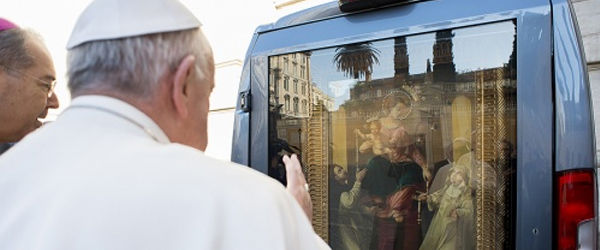There's an adage that says that an atheist is simply someone who cannot grasp metaphor. Thomas Halik, the Czech writer, would suggest rather that an atheist is someone who cannot be patient enough with God. There is a lot of truth in that. Patience with God is perhaps our greatest faith-struggle. God, it would seem, is never in a hurry — and because of that we live with an impatience that can test the strongest faith and the stoutest heart. Life, as we can all attest to, is not without its bitter frustrations and crushing heartaches. We all live with a lot of pain and unresolved tensions. Who among us doesn't experience regularly the pain of sickness, various kinds of personal and professional failure, some kind of humiliation, the inadequacy of self-expression, the soul-searing losses of loved ones, every kind of frustrated longing, and the nagging pain of life's inadequacy? In this life, there's no such thing as a clear-cut, pure joy. Rather, everything comes with shadow. We do in fact live inside a certain valley of tears. We are built for happiness, but pure happiness never quite finds us. Neither, it would seem, does justice. Jesus promised that the meek would inherit the earth, but mostly it doesn't seem that way. The arrogant among us often belie that. There's an infamous Ziggy cartoon which shows him praying to God in these words: “I just want to let you know that the meek are still getting clobbered down here!” Often that appears to be the case. So where is God? Where is the truth in Jesus' promise about the meek inheriting the earth? In the face of long-standing global injustice, we either live in a long-suffering patience with God or we come to believe that neither God's promises nor God's existence hold true.
If atheism is just another way of saying, “I will no longer wait for God,” then the opposite is also true. Faith is just another way of saying, “I will wait for God.” If atheism is impatience, faith is patience.
When Jesus was dying on the cross, some onlookers were taunting him and challenging his message with the words: If you are the son of God, let him rescue you! In essence: If God is real and your message is true, prove it right now! And God let Jesus die! The same held true for Jesus himself in the face of the death of Lazarus. In essence, he was being challenged: If you possess God's power in this world and you love this man, why don't you save him from dying? Jesus let Lazarus die! And the first community of disciples, immediately after the Ascension, painfully struggled with the same question: Jesus is God and he loves us — so why does he let us die? Each of us asks that question in our own way because what we want is a God who rescues us, who intervenes actively for justice and goodness in this world, who acts visibly now in this life, and who doesn't let us get sick and die. None of us want a God who asks us to live in life-long patience, predicated on the promise that in the end, whenever that will be, love and justice will prevail, all tears will be dried, and all will finally be well. We want life, love, justice and consummation now, not in some distant future and only after a life-time of heartache. God, as an old Jewish axiom puts it, is never in a hurry! And so we live with a lot of expressed and unexpressed impatience with God. Atheists, it would seem, at a certain point just give up on playing the game and, in essence, say the words: I've seen enough; I've waited enough; and it's not enough! I will no longer wait for God! But if atheism is just another way of saying, “I will no longer wait for God,” then the opposite is also true. Faith is just another way of saying, “I will wait for God.” If atheism is impatience, faith is patience. The Italian spiritual writer, Carlo Carretto, after spending more than 20 years in solitude as a monk in the Sahara Desert, was asked what single thing he felt that he heard God most say to him inside of the long, deep silence. What, he was asked, do you hear God saying to the world? His answer: God is asking us to wait, to be patient! Why the need for such great patience? Does God want to test us? Does God want to see if we indeed have a faith that is worthy of a great reward? No. God has no need to play such a game, and neither do we. It's not that God wants to test our patience. The need for patience arises out of the rhythms innate within life itself and within love itself. They need to unfold, as do flowers and pregnancies, according to their own innate rhythms and within their own good time. They cannot be rushed, no matter how great our impatience or how great our discomfort. And neither can God be rushed, because it is his timetable that protects us from perpetually stunting life and love by drawing them through the birth-canal prematurely. Oblate of Mary Immaculate Father Ronald Rolheiser is a specialist in the field of spirituality and systematic theology. His website is www.ronrolheiser.com.
{gallery width=100 height=100}gallery/2012/0727/rolheiser/{/gallery}

